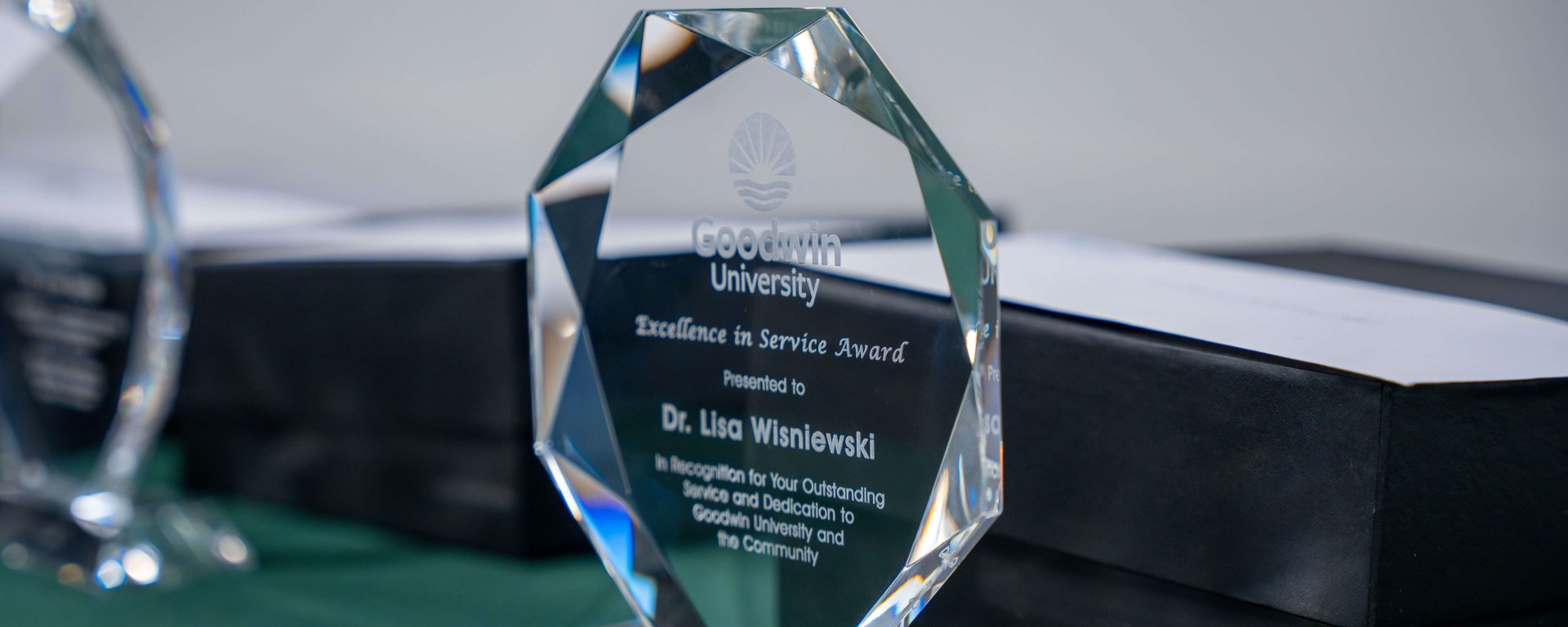Attending school six days a week may sound like a grind to some. But growing up in the 1990s, this was the norm for Dr. Lisa Wiśniewski. Attending a Connecticut-based Polish school, she was immersed in her culture and ancestry — both in her education and at home. Representing the born-and-raised generation, her parents and grandparents emigrated from Poland to Connecticut before her lifetime.
While her heritage had a profound influence on her identity, Lisa was destined to introduce something new to her family culture — higher education, an opportunity she would be the first of her family to pursue. “My parents always told me, ‘You’re going to college. We came to this country so you could go to college,'” Lisa recounts, “But they didn’t know how to help me through it.”
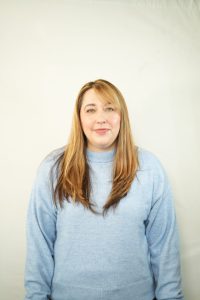
As the first of her family to attend college, faculty expert Dr. Lisa Wiśniewski dedicates herself to making higher education accessible for first-generation students.
Lisa — like many first-generation students — confronted unique obstacles as she embarked on her journey through higher education — institutional familiarity, imposter syndrome, and a shift in her familial culture each presented foreign yet formative challenges.
Despite these obstacles, Lisa persisted — earning her bachelor’s, master’s, and doctorate degrees. Now an influential faculty leader at Goodwin University, Dr. Wiśniewski wears many hats. In addition to her role as a professor, she leads the faculty senate, helps guide the implementation of Universal Design for Learning (UDL), hosts a UDL podcast, and conducts research focused on learners like her — first-generation students.
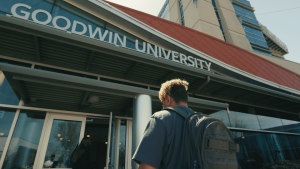
Dedicated learners attend Goodwin University to pursue a career-focused education.
As an institution emphasizing accessible learning, nearly 60% of Goodwin students are first-gen learners.* While this experience may not be rare, it can be nonetheless isolating and difficult. We sat down with Lisa to discuss her advice on succeeding as a first-gen student.
Read on to discover how first-gen learners can make the most of higher education!
Tip #1: Find the school for you
Choosing a college or university can be a challenge for any prospective student. For first-generation students, however, identifying the right fit may feel more stressful. Without the guidance of families who’ve completed higher education, figuring out where to begin can be overwhelming.
Lisa encourages first-gen learners to explore their options. One way to start is by considering what you want to study. “There can be a bit of an assumption that every major is available at every school, but that’s not true.” Lisa continues, “Understanding what a school offers and how it aligns with your goals is key. Do a little homework as to which programs are being offered.”
It isn’t just majors that prospective first-gen students should consider — through research and personal experience, Lisa has found that the size of a school is also a critical factor. “I started at UConn,” she recalls, “but it was too big for me. If you’re unfamiliar with college, a smaller school is probably best for you. You’ll have more one-on-one support.”
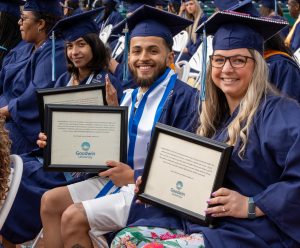
“One of the things my sister and I really liked about Goodwin is that it’s a much smaller university. We felt lucky to be in smaller classes and get one-on-one support. Our cohort groups repeated, too, so you could get to know people in your program and study together.”
– Carlos Omar Argueta, graduate
Other factors to consider? Location, location, location — and flexibility. “Some first-generation students are of traditional college age and want a traditional experience,” she explains, “but most have non-academic responsibilities and don’t move far from home. So, look at the proximity to your home, see what’s right for you, and consider the class times that are offered.”
Finally, Lisa stresses that students shouldn’t discount a school because of the price tag. “A lot of the time, students follow the price tag, and that isn’t necessarily the best route. Do some work to research scholarships and financial aid. See what they offer and what you’re eligible for. Something that’s a great deal on paper might be a cheaper institution, but the school may not be aligned with your goals.”
Tip #2: Get to know your university
Finding the right school is often only the first step for first-gen learners. A lack of institutional familiarity (or knowledge of the structures and services provided by a school) can be a significant hurdle. Getting to know your university before classes even begin can be essential in overcoming this obstacle. “Become familiar with the campus,” Lisa suggests. “Find the time to come visit and take a tour.”
Touring a campus doesn’t only benefit you by providing a lay of the land — it’s also an opportunity to establish connections and ask essential questions. “Don’t be afraid or embarrassed to ask questions,” Lisa advises. “I always say if you have the question, someone else does too. Have a conversation with someone on campus. More information is always better than none.”
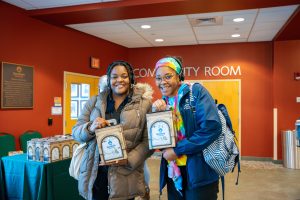
Two new students, excited and ready to attend Goodwin’s 2024 Welcome Week.
Still, Lisa expresses that it isn’t just a student’s responsibility to seek clarity — in fact, many first-gen learners may feel uncertain about what questions to ask. Instead, Lisa suggests, getting to know a school should be a two-way street — universities should operate transparently, anticipate questions and concerns, and make important information universally accessible. “It needs to be a relationship between the students and the institution,” she states. “Schools can certainly do a great job outlining policies and procedures, but not everything can be found in a handbook.”
Lisa continues, “This is especially true with higher ed terminology. For example, what does a registrar do? What does a dean do? If there are ways for institutions to make that information clear, whether it’s through a new student orientation or another process, students will be more comfortable asking questions. At Goodwin, we provide students with an informational guide during their orientation. Without access to that information, they’re not getting the support they need.”
Tip #3: Connect with colleagues
Acclimating yourself to higher education isn’t only about knowing your school; it’s also about making meaningful connections with others, which is particularly pertinent for first-gen students. “Sometimes, it makes the transition to college all the easier when you have people who recognize you and know your story,” Lisa suggests.
When you begin your classes, you immerse yourself in an educational culture alongside other ambitious students. At universities like Goodwin, where a cohort model keeps you in toe with the same group of colleagues, this presents an opportunity to get to know other learners on a deeper level — providing one another with assistance, peer guidance, and collaborative support. “Finding study groups and classmates to help you navigate this new stage is important,” Lisa attests.
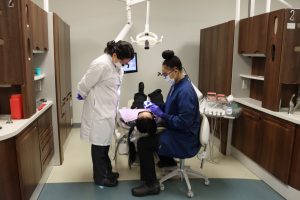
Goodwin’s Dental Hygiene students work together in our on-campus clinic to practice and hone their skills.
For first-gen students, familiarizing yourself with classmates can be especially intimidating. Imposter syndrome and anxiety may creep up, but Lisa encourages quelling these fears by avoiding any assumptions. “First-generation students can feel like they’re not starting on the same level as other students, but don’t assume other students are more prepared than you,” she advises. “Everybody has a story. You may even be in a class with mostly first-generation students and not even realize it. Have an open mind and get to know your classmates. Be open to hearing their stories.”
If you’re looking to establish peer connections outside of the classroom, there are other options you can explore, too. “Student engagement is a great resource for helping you feel like part of the campus community,” Lisa posits. “See if there are clubs, activities, or even just an event that can help you meet people and familiarize yourself with the university’s culture.”
Did you know that nearly 60% of Goodwin students are first-generation learners? Our programs are designed with your achievement in mind — putting accessibility, flexibility, and student-centered support at the forefront of everything we do. Learn how the Goodwin community can support your dream of higher education today!
Tip #4: Get to know your faculty
While connecting with others may be critical, Lisa stresses that opportunities for support extend beyond fellow students. Fostering faculty relationships facilitates your long-term success, not only as you work toward your degree, but as you embark on your professional future.
Lisa encourages first-gen learners to make an immediate effort to connect with professors. Making a positive impression through open communication can be indispensable in navigating your college career. “Circumstances are different for every student, but first-generation students often have family obligations or other commitments,” she details. “If something is going on, share it with your faculty if you feel comfortable doing so. Communicate early and often so they can work with you to plan and make accommodations as needed.”
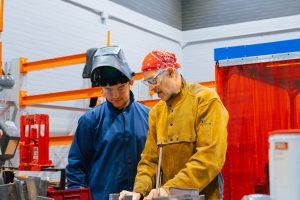
Goodwin faculty work closely with students to provide one-on-one support and hands-on guidance.
Faculty don’t only aid in your success throughout the semester, either. In fact, if you continuously prioritize connections with former and current professors, you can progress toward achieving your professional goals. “I always say faculty are the most underutilized resource,” Lisa explains. “When you pick a major, you’ll often have the same professors more than once. Get to know what they do because we faculty don’t just teach — we do research, too. We also have different connections in our fields. We have the ability to share these connections with our students.”
Furthermore, Lisa reiterates that by knowing students well, faculty can provide tailored support and guidance upon graduation. “The best thing I can do for a student is give them a job recommendation, but I can’t really do that if I don’t know your goals and desires. Let your professors get to know you and get to know them.”
Tip #5: Explore your resources
It isn’t only faculty you can build transformative relationships with — universities are full of resources and staff dedicated to your success. Lisa suggests thinking about your goals and necessities and working from there. “Build academic and personal support around what you need,” she advises.
One place to start? Your classwork. “We have the Academic Success Center at Goodwin, and you can get free tutoring. They sometimes offer workshops focused on specific skills, too,” Lisa continues, “like how to best study for a science class. Take advantage of those resources.”
Further encouraging first-gen learners to explore school services, Lisa suggests utilizing the library. “The library is a great resource for researching and helping you with papers,” she offers. “Other support departments, like IT, are also essential. You’ll have questions once in a while, so you should get to know where you’ll need to go and who you’ll need to talk to if an issue comes up.”
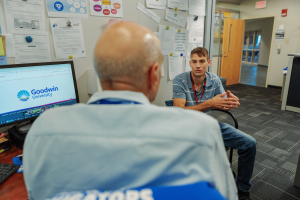
Goodwin students and graduates can receive tailored professional guidance at Career Services.
Beyond academic support, first-gen learners can also benefit from holistic support services. “Counseling is free to students here,” she outlines. “That’s an incredible opportunity to take care of yourself and what you need. These resources are accessible, and you should use them.”
Moreover, universities like Goodwin offer students and graduates lifelong career services — meaning you’ll have access to tailored support even after graduation. “You can gain career readiness skills and engage in all different types of workshops,” Lisa recommends. “Don’t think a workshop isn’t for you. Take everyone you can.”
Tip #6: Consider your strengths
Higher education is often synonymous with self-discovery. Part of the personal exploration process is accepting and embracing your identity as a learner. To make the most of this journey, consider the careers that best suit your interests, abilities, and aspirations.
“If you want a healthcare career but don’t enjoy math or chemistry, Nursing might not be the best program for you,” Lisa suggests. “However, we offer plenty of other healthcare programs, and you can find one that lends well to your skills.”
Better still, Lisa suggests that by embracing your strengths and weaknesses, you can confront anxiety and imposter syndrome. “Much of imposter syndrome comes from worrying people will discover what you don’t know. We all have some skills we take for granted or assume everyone has,” she outlines. “Examine your talents and know what skills you need to build off of. Surround yourself with the people and the resources that support you in building those skills.”
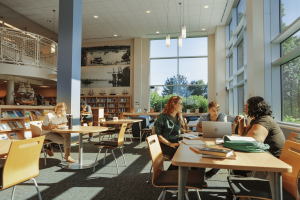
Goodwin students collaborating and connecting at the Hoffman Family Library.
Additionally, Lisa highlights how the Universal Design for Learning (UDL) framework helps students access high-caliber content while flexing to their individual strengths. A staple of Goodwin’s educational model, UDL provides multimodal opportunities to receive and express knowledge — creating equity and inclusion for diverse learners with eclectic skills. This principle can be particularly impactful for first-gen students. “If I am an English language learner and writing isn’t a strength, I may be able to do a video presentation instead,” Lisa suggests. “Strategies like UDL help students guide and tailor their own learning.”
Tip #7: Embrace change
Apart from higher education and career-ready training, attending a college or university yields an additional, less measurable long-term effect — personal transformation. “I always tell students the person who walked in the door at new student orientation should not be the same person at graduation,” Lisa measures. “It’s not just about academic growth. The college experience provides social and emotional growth as well.”
While the transformative value of higher education yields significant effects for every student, the context of these changes can create distinct challenges for first-generation learners. “You’re introducing college into the culture of your family, and that’s a change. The time you had available for family might change, and everybody has to adjust to that.”
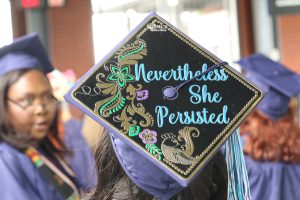
At 2023 Commencement, Goodwin graduates celebrated their journeys to the finish line.
Lisa continues, “There’s that cultural expectation, and that can be a process for the whole family. There can be pressure on the student, too, to help the family socioeconomically but you may not be able to do that immediately after you graduate.”
For many first-gen learners, this can be an isolating experience. “You may feel like you don’t fit in at school, and also feel ostracized by your family,” Lisa reflects.
Nonetheless, Lisa encourages embracing these obstacles with an open mind. “Understand you’ll be different after you graduate. Things will change and that might be hard, but we’re here to help,” she offers. “Finding your people on campus can help you navigate your way to the person you’re trying to become.”
Making the most of the journey
Considering the college journey for first-gen students like herself, Lisa encourages learners not to define higher education by its obstacles but rather the fulfillment and self-realization that can be achieved. “In your journey, think about the person you want to become. Who do you want to be? How will college help you get there? It’s going to be different for everyone, so be open to the process. You create your life.”
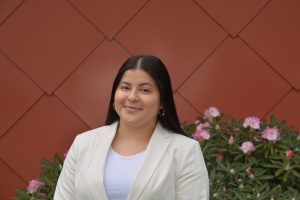
“It’s hard, and it may feel a little bit more intimidating for first-gen Latinos. You may see people who don’t look like you, but if you reach out and seek support, you can find the people who understand you. If you want a college education and want to make a change, you can go for it. It may not be the typical experience, but it will be the best thing you ever chose.”
– Leslie Argueta Linares, graduate
*Based on fall 2023 Institutional Profile
Dr. Lisa Wiśniewski
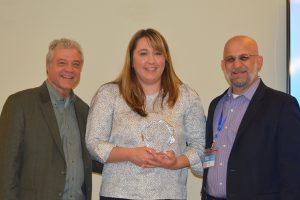
Dr. Lisa Wiśniewski being honored at the Faculty Reception in November 2022, pictured with President Mark Scheinberg (left) and Vice President for Academic and Student Affairs Michael Pardales (right).
Dr. Lisa Wiśniewski is a Professor of Sociology at Goodwin University. Her research has focused on immigrant students, the scholarship of teaching and learning, and effective teaching practices focused on Universal Design for Learning (UDL). With an interest in digital literacy, Dr. Wiśniewski also hosts and produces the Community Conversations @ Goodwin University lecture series. The series if focused on current events topics and global citizenship. The lectures have redesigned for course curriculum in alignment with the UDL framework and Open Educational Resources (OER).
Dr. Wiśniewski presents regionally, nationally, and internationally and has consulted on effective teaching practices (pedagogy, curriculum design, course design) at the higher education level. Lisa also served as the State Chair for the CT American Council on Education Women’s Network. She is currently the President of the Faculty Senate at Goodwin University.
She also has several publications, podcasts, and blog posts featuring her work in teaching and advocacy. Her work has been featured in the Huffington Post, WNPR, McGraw-Hill, iHeart radio, and international press in Poland. Currently, she is focused on supporting individuals who have resettled in Connecticut from Ukraine to navigate the resources available. In this role, she works with Connecticut-based organizations to support and provide access to resources in the community. There is also a strong focus on partnerships with international scholars to spread awareness on this topic.
At Goodwin University, we start with you. With comprehensive support services, career-ready programs taught by expert faculty, and meaningful ties to the community, you’ll be on the fast track to achieving your personal, professional, and academic goals. Learn how Goodwin can support your success today! Call 800-889-3282 or text 860-467-1511.
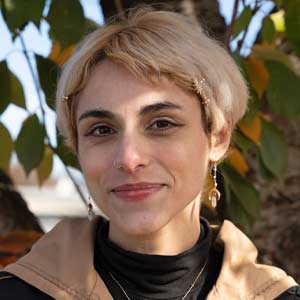
Bri Gagné is a content developer at Goodwin University, bringing backgrounds in literary studies, creative storytelling, Universal Design for Learning (UDL), and social justice. They earned their bachelor’s degree in English Literature, Film Studies, and Gender Studies from University of Connecticut and a master’s in Elementary Education from Eastern Connecticut State University.
After teaching English abroad and locally, Bri transitioned to a full-time writing career, contributing to the University’s educational narratives and brand-building efforts. They are currently earning their Master of Fine Arts in Popular Fiction Writing and Publishing at Emerson College.

